#wwi trench watch
Explore tagged Tumblr posts
Photo




Staggeringly crisp men's World War I era hunter-cased wristwatch with a correctly re-created two-piece cordovan strap and sterling silver buckle, circa 1918.
#trench watch#wwi#wwi trench watch#military watch#vintage watch#Strickland Vintage Watches#men's fashion#men's vintage fashion#1918 fashion#men's watches#horology#vintage timepiece#timepiece#men's antique watches#antique watch#ww1 history#fliptop watch#vintage fashion#men's style#vintage lifestyle#true vintage
7 notes
·
View notes
Text
One of my favourite WWI anecdotes was one British soldier recalling the start of the war when the first trenches had only just been dug—back when barbed wire wasn’t laid and steel helmets hadn’t even been issued yet—and said he and his comrades watched the Royal Engineers pull up unannounced with a reel of barbed wire and proceed to lay what looked to be a “clothesline” in front of the trench so tall a “giraffe could walk under it” and I could not stop laughing imagining the RE just standing back after proudly laying their Single Line of barbed wire to defend against the Entire German army like

#oh bless ‘em#they laid their own barbed wire for the rest of the war#some of the funniest things I’ve read come from that book#wwi#world war 1#great war#history
997 notes
·
View notes
Text
In lieu of @motions1ckn3ss ‘s absolutely WONDERFUL essay about ellwood’s relationship with poetry, I’ve been inspired to post my history essay that analyzes the way WWI is shown in In Memoriam! (Strap in this will be long lol)
Nothing Is Worth This: How In Memoriam Portrays WWI
Alice Winn’s debut novel In Memoriam is a hidden gem amongst the growing popularity of historical fiction. Published in 2023, the novel follows the lives of English schoolboys Henry Gaunt and Sidney Ellwood. As the First World War breaks out in 1914, they face two battles; the Western Front and their growing feelings for each other. Together they watch as friends die around them, and as the war changes their lives forever.
The novel explores tumultuous conditions soldiers faced in the trenches, such as mud, poor rations, and gas attacks. Classism, social dynamics during WWI, attitudes towards homosexuality, and trauma are also touched on.
When one thinks of trenches, the first image that comes to mind is likely muddy, rat-infested mazes that snake around a war-torn No Man’s Land. Winn perfectly portrays the horrors of trench warfare throughout the novel, one notable interaction is from a letter Gaunt sends to Ellwood when he reaches the front:
“I throw myself to the ground, and the mud is foul. It’s not like mud, Elly, it’s cursed. It’s– Like everything else, I can’t explain” (Winn, 35).
There is no greater example of the terror of mud in the Western Front than the fields of Passchendaele. In August of 1917, Belgium saw unprecedented amounts of rain which led to treacherous conditions. Bombardier JW Palmer, 26 Brigade Royal Field Artillery, writes in his account:
“It was mud, mud, everywhere: mud in the trenches, mud in front of the trenches, mud behind the trenches. Every shell hole was a sea of filthy oozing mud. I suppose there is a limit to everything but the mud of Passchendaele – to see men keep on sinking into the slime, dying in the slime – I think it absolutely finished me off” (Battersby).
One of the most dreaded side effects of mud was trench foot, an infection that ravaged soldiers. It is caused by prolonged exposure in cold, damp and unsanitary conditions. Symptoms include swelling, numbness, blotchy skin, and if it develops enough, blisters and dying skin tissue (CDC).
When not on the battlefield, men were treated to daily food rations. Rations in the trenches consisted of corned beef, bread, plum and apple jam, tea, whiskey and rum. Water was often disinfected with chlorine and had a chemical aftertaste. The novel discusses food supply on both the British and German sides, and even touches on food shortages throughout the rest of Europe. A scene where Ellwood and Gaunt’s sister, Maud, eat at a cafe details the pitiable amount of butter on their scones. At the front, flies and rats infested everything, eating the men’s rations and spreading disease. British infantryman Victor Silvester wrote in his diary:
“That night I had been asleep in a dugout [for] about three hours when I woke up feeling something biting my hip. I put my hand down and my fingers closed on a big rat. It had nibbled through my haversack, my tunic and pleated kilt to get at my flesh. With a cry of horror I threw it from me.” (Hamilton, 18).
A few passages in the novel are dedicated to the conditions of the food. Often it is writtens in a way that a reader may interpret as gallows humour.
“The flies plagued them, feasting on the dead and then coming to sit amicably on the men’s rations. They got stuck in the jam, which was always plum and apple […] As to apples, the sour, fly-covered substance that they ate with bread at five each evening had as little relation to them as the ‘meat cutlets’ had to meat” (Winn, 91).
“‘D’you want a cup of tea?’
‘Will it taste of disinfectant?’
‘’Fraid so.’
‘Well, better have it all the same’” (Winn, 95).
It is often described that soldiers had two emotions at the front: boredom and terror. One of the harbingers of terror included poison gas. First used at the Second Battle of Ypres on 22 April 1915, the Allies were devastated by the chlorine gas that was unleashed in unprecedented quantities by the Germans.
The British then managed to use gas at the Battle of Loos, prompting both sides to develop protections against gas attacks. These defences started out as cotton pads covering their mouths, soaked in chemicals–or in desperate situations, urine–and goggles to protect their eyes. Throughout the war the makeshift masks developed into more sophisticated gas masks.
The brutality of poison gas in warfare was so acute that it was outlawed by the Geneva Protocol in 1925. Just ten years after its initial use. Renowned poet Wilfred Owen captures the trauma of gas in his famous poem Dulce Et Decorum Est.
“Gas! GAS! Quick, boys!—An ecstasy of fumbling/Fitting the clumsy helmets just in time,/But someone still was yelling out and stumbling/And flound’ring like a man in fire or lime.—/Dim through the misty panes and thick green light,/As under a green sea, I saw him drowning” (Owen, 9-14).
A similarly moving passage is found within the novel, when Gaunt is faced with Algerian soldiers fleeing from gas at Ypres.
“More Algerians came flooding by. Some were only choking, but others were coughing up scrambled bits of lung, their lungs were melting inside them and drowning them” (Winn, 75).
Gaunt continues to reflect on the effect colonialism has on war and the useless attempts to try and make war ‘civilised’ by using laws such as the Hague Convention, which are so easily ignored.
“We swarmed through Africa and America because we were better than they, of course we were, we were making war humane, and now it has broken down and they are dragged into hell with us. We have doomed the world with our advancements, with our democracy that is so much better than whatever they thought of, with our technology that will so improve their lives, and now Algerian men must choke to death on their own melted insides in wet Belgian trenches” (Winn, 75).
Empires such as Britain invaded countless countries, stealing their resources and enslaving people. They exploited those countries so they had to rely on their economy, and used it to justify their ownership. All because they believed that they were more civilised than everyone else; despite the ungodly circumstances modern warfare put soldiers in.
Winn captures the grime, fear and misery that comes with living in the trenches. From vivid descriptions of shellfire and gas, to the bland and occasionally humorous details regarding a soldier’s diet. Undoubtedly, one can imagine themselves slogging through the muddied land of war-torn Belgium with each turn of a page.
Moreover, one theme that is prevalently explored throughout the novel is classism and how it affects soldiers during the war. Gaunt and Ellwood come from privileged backgrounds, going to a public school called Preshute and immediately receiving their commission when they enlisted. When writing to Gaunt, Ellwood discussed how he was even able to choose his own regiment.
“When we next meet I shall be a second lieutenant in the Royal Kennet Fusiliers, Third Battalion. I’m glad I was able to pick my regiment! (It’s all about who you know)” (Winn, 80).
Having connections with the higher class means receiving certain privileges that others don’t have access to. Officers frequented the same upper class social circles, due to there being so few prestigious universities in England. Favours for friends or family members was extremely common and gave commissioned officers opportunities that weren’t available to the working class.
By contrast, they meet a fellow junior officer Lieutenant David Hayes, who did not come from a rich background. Throughout the book his uniform is described as poorly fitting, due to his inability to afford a proper tailor. Hayes quickly becomes friends with Gaunt but is wary of Ellwood, the stark contrast between their socioeconomic positions leading to a strained relationship.
“‘I say, is it really true he was a factory worker before all this?’
‘He’s awfully sharp, isn’t he?’
‘Do you think he’d take offence if I recommended him a new tailor?’
‘Yes,’ said Ellwood, flatly” (Winn, 269).
“‘Said it’s a stone ginger.’
‘...Translate,” Gaunt said to Hayes, as they climbed into the train carriage. Hayes understood Cockney and trench slang far better than the public school officers did” (Winn, 120).
“I’ve been made captain. Seems a well-tailored uniform and the right accent make me a better candidate than Hayes, despite his years of experience” (Winn, 77).
Additionally, Gaunt writes in a letter that one of their schoolmates would hypothetically refer to Hayes as a “temporary gentleman.” This phrase was used throughout WWI and continued into the interwar period and WWII. The phrase refers to non-commissioned officers who gained a temporary commission for the duration of the war, especially if they came from outside the upper class.
“He’s what someone like Burgoyne would call a ‘temporary gentleman’ (disgusting term), that is to say, he was a factory worker in Lewisham before he joined the War” (Winn, 40).
Gaunt continues further, noting that lower-class officers related more to the men, and were more effective on the battlefield. While both Gaunt and Ellwood know that Hayes is a more than capable officer, Hayes recognizes that due to his class, it is unlikely he will ever be promoted to captain.
Life in the trenches caused a mixing of race, class, religions, etc. Before the war, commissioned officers were upperclassmen who were educated in public schools and universities, sometimes coming from previous military backgrounds. The ideal “officer material” of the time was more akin to the “perfect gentleman” than a skilled soldier. When the war started, junior officers had an extremely high mortality rate. Officer training schools could not keep up with the demand, so soldiers and NCOs were promoted and received commissions (Root, 3-4).
English poet Robert Graves wrote about his wartime experiences in his autobiography Goodbye To All That. He details that certain social manners and behaviours among officers were more relaxed than in civilian life. Graves was also an instructor at an Officer Cadet Battalion in 1916, in order to train new officers. All recruits were treated and trained equally, and though he disparages that many men lacked the proper manners; he understands that this new way of training was considerably more effective (Root, 5).
“Their greater efficiency in action amply compensated for their deficiency in
manners” (Root, 5).
Another famous war poet from the time, Siegfried Sassoon, had a similar view. However, he held greater scorn for the lower class officers. In May of 1916 he wrote in his diary:
“Of all the officers having dinner, I saw no face with any touch of distinction in it. They were either utterly commonplace or self-satisfied, or else tired-looking, feeble, goggle-eyed, or otherwise deficient. Why does one see so few proper-looking officers?” (Root, 6).
But he also found that some commissioned officers had acute character flaws. Such as an interaction he had with an officer who was constantly drunk and “quite irresponsible and not trustworthy.” Thus, we can see how life on the frontline can blur the lines between classes. Men judged each other on their personal merit rather than their alma mater.
With much more relaxed ideas of social responsibility being so prevalent amongst soldiers, it allowed for more men to engage in relationships that were heavily frowned upon at the time.
In Memoriam is a love story first. Gaunt and Ellwood spend a large amount of the novel pining for one another, understanding the great amount of risk that comes with pursuing such a relationship. Ellwood is more outwards with his homosexuality, he is revered throughout the school and is able to get away with more risky behaviours. This is opposed to Gaunt who keeps any sort of interaction of that nature a secret. The politics of homosexuality in public schools at the time are explored in the novel and are indeed quite interesting, but it differs from attitudes in the trenches.
During the early 1900s, homosexuality was at the forefront of moral panic. Public trials from previous years such as that of Oscar Wilde and the Eulenburg Affair brought a topic that was usually brushed aside into the spotlight. Homosexuality was punished with jail time and years of hard labour under the Gross Indecency Law. Alongside that was social discrimination and the loss of reputation amongst family and loved ones.
In the late 1800s, Germany had a large scandal known as the Eulenburg Affair. Members of Kaiser Wilhelm II’s cabinet were outed for being gay, resulting in several trials and court-martials. As a result of this public scandal, the British found homosexual acts to be ‘unpatriotic’ and associated with German sympathies (McGhee).
Within the British army, punishments for homosexuality included court martialing, loss of rank, and imprisonment. “Cashiering” was a humiliation ritual that was performed when an officer was dismissed for scandalous misconduct. It involved ripping off insignias, badges and other symbols in front of other officers (Bronskill). This concern is portrayed in the novel by characters such as John Maitland, who warns Gaunt about his letters between Ellwood, and Hayes who warns Ellwood about his behaviour with a lower ranking soldier.
“‘Shut up. I’m not reporting you. I’m trying to help. Can’t you see that if you let Sidney write this sort of letter, you’ll get him imprisoned?’” (Winn, 66).
“‘Do you know what would happen if someone caught you and him? They’d say he assaulted you. That it was all his fault. He’d be court-martialed and shot so fast for daring to besmirch his precious public school captain—’ Ellwood stared at Hayes. It hadn’t occurred to him, any of it” (Winn, 192-3).
Despite all of this, the trenches fostered a culture of male affection that was able to be masked within the realm of hyper-masculinity and the guise of being bonded by war. Figures such as Robert Graves, Siegfried Sassoon (who were the inspirations for Gaunt and Ellwood), E.M. Forster, Ethel Mary Smyth and Wilfred Owen all served in WWI and are widely understood to be a part of the LGBTQ+ community. Attitudes towards homosexuality on the front varied. In rare cases some men were able to come out to their comrades, being met with acceptance. But generally it was frowned upon.
The very foundation of an effective army is camaraderie, and when men are facing constant traumas together a kind of brotherhood is formed. These homosocial behaviours allowed for more physically affectionate relationships. Even heterosexual men found these special friendships to be a relief from the stresses of war.
“Thomas Kühne has argued, men celebrated the “softer” side of comradeship, including bonds of love and friendship that sustained them in the other-worldly environment of the trenches” (Crouthamel).
Within these bonds, homosexual men were able to find an avenue for building lasting romantic and sexual relationships with other men under the guise of it being platonic. The novel delves into these kinds of relationships in passages such as a scene in the officer’s train carriage. We see it again in a discussion between Gaunt and Ellwood about using a sexual relationship to distract them from the war.
“Ellwood’s head drooped onto Gaunt’s shoulder. Gaunt stiffened, but when he looked around the carriage, he saw that the other officers were all in physical contact with one another. Huxton had his feet in Hayes’ lap. Hayes rested his head against the arm of an officer from C Company. Men sprawled all over each other. In the hyper-masculine atmosphere of war, they were not overly concerned with manliness” (Winn, 120).
“‘Did it help you forget about the War?’ pressed Ellwood. Gaunt nodded once, jerkily.
‘Well, then.’
‘And after the War? asked Gaunt.
‘It’ll be as if it never happened. I promise.’
‘You promise, do you?’
‘Yes. It doesn’t mean anything, Henry. Only that we want to forget things, once in a while” (Winn, 108).
Letters were another way for men to bond with one another, though it was a hazardous form of communication. Officers would read through letters and censor them before they were sent. If any illegal actions were mentioned the sender or recipient was at risk of being reported. Wilfred Owen’s letter to his cousin in 1918 reflects this anxiety:
“There are two French girls in my billet…Naturally I talk to them a good deal; so much so that the jealousy of other officers resulted in a Subalterns' Court Martial being held on me! The dramatic irony was too killing, considering certain other things, not possible to tell in a letter” (The Week).
A particularly striking scene in In Memoriam touches on this topic.
“He lifted the cover and looked at the first sheet of paper, instantly recognizing Gaunt’s neat blue handwriting: My dearest, darling Sidney,” (Winn, 189).
After the war, Germany had a spark in their gay rights movement. Many men felt that they had fought the war for nothing, with gay men knowing that they fought for a country that did not allow them rights as citizens (Marhoefer). Men used their military service as a reason to be accepted into society, showing it as proof of their patriotism and dedication to their country.
Magnus Hirschfeld opened his Institut für Sexualwissenschaft (Institute for Sexual Science), which pushed for the rights of LGBTQ+ individuals and was one of the pioneers of gender-affirming surgery. The Scientific Humanitarian Committee was one of the leading gay rights groups in the world during that time. This progress continued throughout the interwar period, with Weimar Germany becoming a hotspot for LGBTQ+ individuals. Berlin’s nightlife thrived with gay clubs before the Nazi party rose to power.
Near the end of the novel, Gaunt’s sister Maud explains how she is moving to Berlin to study at the Scientific Humanitarian Committee and encourages Gaunt and Ellwood to visit. She even mentions Paragraph 175, which was a law criminalising homosexuality in Germany. Paragraph 175 wouldn’t be abolished until 1994.
“The Weimar Republic is more open to progress than the governments of Englnd and France. I know you miss Europe. I hope you miss me. I cannot say whether Paragraph 175 will be revoked this year, or this decade, but I can tell you that there is a world for you and Sidney here. There has never been a movement like this before” (Winn, 371).
As previously mentioned, men used close intimate connections to deal with the trauma of war, but the rest of the world was less kind to those relationships. Similarly, those struggling with Post-Traumatic Stress Disorder also faced social ridicule. PTSD, formerly known by many names such as shellshock, war neurosis and combat fatigue, was seen as a new phenomenon amongst men returning from war. Despite this view, soldiers from across history had suffered from the psychological effects of warfare. About 80 000 British soldiers suffered from shellshock after the First World War. There is a wide variety of symptoms but prominent ones include tremors, nightmares, insomnia, anxiety, flashbacks, amnesia and paralysis (Jewell). The effects of trauma are heavily explored in the novel, with Gaunt suffering from vivid nightmares and insomnia and Ellwood undergoing a complete change in personality after the war.
“Gaunt never seemed to sleep. Sometimes Ellwood would return to the dugout to find him lying on his wire bench, candlelight glinting in his bloodshot eyes” (Winn, 93).
“Ellwood did not say anything. He could not explain why that drop of blood on his mother’s finger had so appalled him, when he had seen West’s brain pulse with his last heartbeats and felt nothing except dispassionate curiosity” (Winn, 181).
Charles Myers, one of the first to write about shellshock, theorised that exposure to explosive blasts caused a form of brain trauma that aligned with the symptoms. After various tests, his ideas were disproven. As PTSD became less linked with physical injury, it became closer associated with cowardice (McDonald et al.).
At the time, a large ideal men strived for, especially amongst the upper class, was fulfilling the idea of bravery. The widows of men who were executed for cowardice often weren’t financially compensated. The ideal soldier at the time was one who would fight ‘for King and Country’ and a large amount of shame was put on those who, quite naturally, fled during the line of fire.
Cowardice is shown on multiple occasions in the novel. One officer by the name of Carrington suffers from severe PTSD, being shown screaming in the faces of other soldiers and having bouts of paralysis. He’s ashamed of his unwanted behaviour and confesses to Ellwood through tears about his cowardice.
“Ellwood threatened to shoot him if he didn’t get up. Carringon tried and collapsed again. Ellwood trained his pistol at his head.
‘You’d better do it.’ said Carrington. ‘I’m a dreadful coward. I know I am.’
[...]
‘There’s nothing wrong with his legs, he just wants to go home!’
‘I do,’ said Carrington, miserably. ‘I do want to go home. I know that’s shameful.’
[...]
Carrington was taken away, whispering ‘I’m a dreadful coward!’ in between spasms” (Winn, 187).
“Don’t know if you heard that Lantham was shot by firing squad. Anyone could see he had neurasthenia; it’s a scandal, but he didn’t go over the top on July 1st, so General Haig signed off” (Winn, 323).
Due to misconceptions at the time, doctors tried many different ineffective and harmful treatments for shellshock. One famous treatment is electroshock therapy. Electroshock therapy was used for a variety of mental disorders throughout the 20th century. Painful electric shocks were administered to the head and neck, in hopes of treating symptoms. These treatments were undergone without any anaesthetic, and often it did not relieve all of the symptoms (McDonald et al.).
Today we have electroconvulsive therapy, which uses controlled shocks on certain parts of the brain to induce seizures in order to treat mental illnesses such as severe depression and bipolar disorder (Psychiatry.org). These treatments are done under anaesthetic and in controlled environments, with studies proving it to be effective.
More often than not, soldiers would self-medicate their symptoms, leading to alcoholism and substance abuse. Alcohol was already offered to soldiers, and drugs such as morphine and cocaine were used during treatments or to boost morale and performance (Kamieński).
“‘Bring out the whiskey,’ said Gaunt, as he did at every meal. Daniels twisted his hands.
‘There’s only one more bottle, sir.’
‘What’s happened to them all? Have you been at them?’
‘No, sir! There were seven, and six have been drunk, sir.’
‘By whom?’ demanded Gaunt.
‘Well, sir, there was the one you had on our first day, and two the day Lieutenant Ellwood arrived—’
‘All right, all right, no need to enumerate them like crimes. Fetch the last one, and we’ll have rum tomorrow.’
‘Yes, sir.’ Daniels hurried away” (Winn, 93-94).
Luckily, not all treatments were dangerous or ineffective. An army physician by the name of Arthur Hurst developed talking therapies after the war. His treatments included using films and simulations to reconstruct soldier’s experiences in order to talk them through the traumatic memories. His treatments boasted vastly higher success rates and his focus on treating cognitive and behavioural symptoms was the blueprint for modern PTSD therapy (Butterworth).
In the modern day, there are many effective treatments for PTSD and trauma, but there is still an underlying stigma that prevents people from seeking out proper care for their mental health.
Although In Memoriam is a fictional retelling of real historical events, there is no doubt that Winn put extensive amounts of research into her novel. Her vivid writing style captures the inhumanity of the First World War and its effects on the psyche of characters and the greater world around them. The novel shows us the love between friends, comrades, family and lovers while tackling topics such as classism, trauma, and LGBTQ+ rights through the lense of our schoolboy protagonists; giving us a glimpse into history while telling a compelling story of love, death, and heartbreak.
Works Cited
“An army marches on its stomach.” National Army Museum.
Battersby, Eileen. “Passchendaele: A killing field of mud – The Irish Times.” The Irish Times.
Bronskill, Jim. “WWI: Study details punishment for soldiers' sexuality.” CTV News.
Butterworth, Benjamin Russell. “What World War I taught us about PTSD.” The Conversation.
McGhee, Beth. “Homosexuality in the First World War - WW1 East Sussex.” East Sussex WW1.
Crouthamel, Jason. “Sexuality, Sexual Relations, Homosexuality | International Encyclopedia of the First World War (WW1).” International Encyclopedia of the First World War.
Dwyer, Kassandre. “Trench Warfare in World War I: Rot, Rats, Ruin.” The Collector.
Freedman, Russell. The War To End All Wars: World War I. Clarion Books, 2010.
Hamilton, John. Trench Fighting Of World War I. ABDO & Daughters, 2004.
Kamieński, Łukasz. “Drugs | International Encyclopedia of the First World War (WW1).” International Encyclopedia of the First World War.
Marhoefer, Laurie. “How WWI Sparked the Gay Rights Movement.” Smithsonian Magazine.
McDonald, MaryCatherine, et al. “From shell-shock to PTSD, a century of invisible war trauma.” The Conversation.
Owen, Wilfred, et al. “Dulce et Decorum Est by Wilfred Owen.” Poetry Foundation.
“Psychiatry.org - What is Electroconvulsive Therapy (ECT)?” American Psychiatric Association.
Root, Laura. “Temporary Gentlemen” on the Western Front: Class Consciousness and the British Army Officer, 1914-1918.” UNF Digital Commons.
“Second Battle of Ypres 22 April – 25 May 1915.” Imperial War Museums.
“The secret history of the gay soldiers who served in the First World War.” The Week.
“Trench Foot or Immersion Foot|Natural Disasters and Severe Weather.” Centers for Disease Control and Prevention.
Washington, Nicole. “Shell Shock and PTSD: Connections, Symptoms, Support, More.” Healthline.
Winn, Alice. In Memoriam: A Novel. Alfred A. Knopf, 2023.
#this is my magnum opus I think#I’ve always dreamed about infodumping about IM as an assignment and here I am lol#I had a blast writing this it was great and it let me annotate the book lol#anyways yeah I hope it was good!!!!!!#I like it at least lol#in memoriam alice winn#in memoriam#alice winn#gauntwood#henry gaunt#sidney ellwood
46 notes
·
View notes
Text
The Harkers should get to have a daughter as well as a son (because Jonathan would be an excellent girl dad) because a well educated, intelligent young lady who knows multiple languages, was raised on telecommunications technology, and had to watch her older brother go to war without being legally able to follow him into the trenches or even old enough to until the war had stretched on for over two years? A Harker??
Anyways here’s a completely unrelated article
#I say legally but it was not the law preventing her from cross dressing into the trenches immediately so much as her parents Refusing#she argued them to 18 and then took off as a Grown Adult#for the sake of this AU there’s a British telecommunications womens unit that works with the US one#or she just has Mina’s psychic rizz and [redacted] her way in without people questioning too much#the Hello Girls are such an interesting group they were deployed in active war zones#one time the building caught fire and operations went down and they were told to evacuate; hour later comms are back up like ‘no :)’#dracula#dracula daily#jonmina#I’m tagging her as#Lucy Harker
21 notes
·
View notes
Text
BLU Spy headcanon and Sniper pee
What if… BLU Spy was from rural France originally, and not the city?
Because the way he acts, you would assume he’d throw a hissy fit over getting dirt under his nails or something minor like that…
But what if it’s an act? As stuck up as he is, he pretends to be grossed out and prissy about everyday messes to keep up his image. And the only thing that actually grosses him out is human waste like Sniper pee?
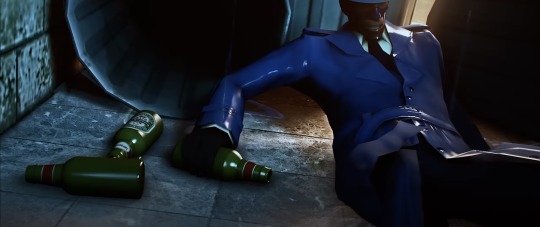
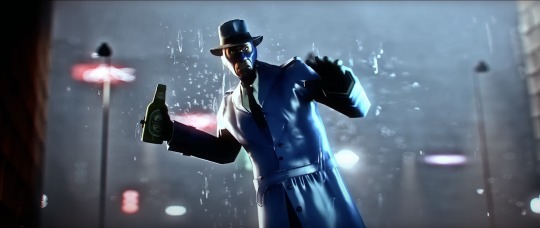
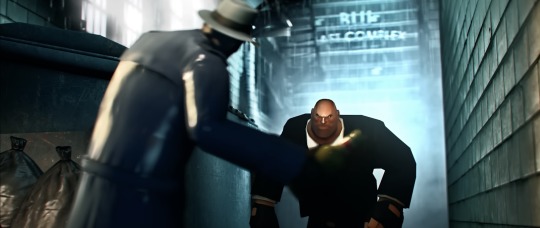
[Throwing dirty bottles from the trash]
Think about it. He doesn’t tell people his name or where he’s from, he doesn’t let them see his face, and he tries to stay aloof. Even to someone as friendly as Soldier. Wouldn’t it make sense to play a part that doesn’t fit your background, so people couldn’t use your behavior to extrapolate your origin?
Animals are not clean, they poop and pee wherever it seems right to them and it accumulates. Farm animals included. And beyond that, gardening and farming requires you to get your hands up in the dirt. But that’s nature, animals don’t have souls and human intelligence. We know what viruses and diseases are; livestock, wildlife and pets do not.
So, in the absence of his suit or reasons to pretend to be a germaphobe, it wouldn’t bother BLU Spy to clean up a horse stable; they need their feces to be taken away so they don’t get worms. It wouldn't bother him to give food scraps to pigs or chickens, and it wouldn’t bother him to get the eggs from the coop.
Walking around cow patties in a field, helping a farm animal with a difficult delivery, and fertilizing a garden or field would not bother him. Killing a farm animal and preparing it to be cooked would not make him squeamish.
But Sniper is a grown man who throws his pee at people intentionally. And to BLU Spy, that’s extra nasty because how does an adult think that’s acceptable behavior? It’s waste; it’s water with all the toxins and ammonia and refuse that your body doesn’t use for energy. And it can make you sick if you get it in an open wound [likely on the battlefield] or drink it, which Snipes may well do.
And it’s probably worse considering the fact that Sniper takes those kidney enlarging pills; they may not be filtering waste out of the body like they were meant to do. I think that when RED Medic brought him back, he replaced his messed up kidneys with some from an exotic animal, since he wouldn’t have gotten the chance prior.
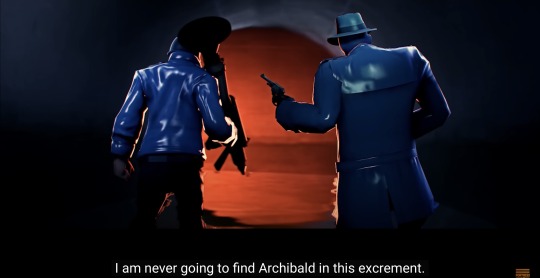
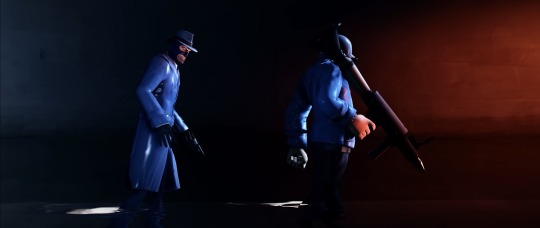
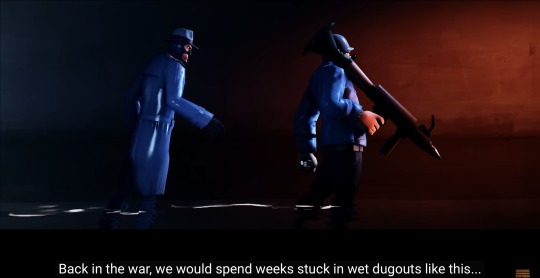
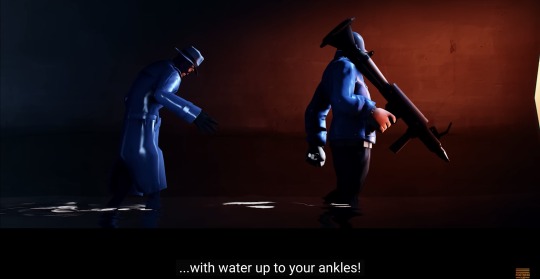
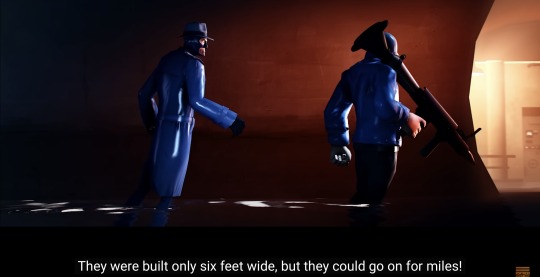
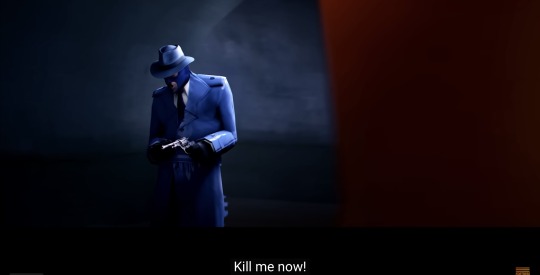
This is an interesting interaction for a few reasons.
The sewage they’re currently walking in is up to Soldier’s knees and almost Spy’s.
Soldier is talking about trench warfare, which is notorious for wet sloppy ground and rats causing gangrene and other illnesses. But the way he talks about it makes it sound less terrible than the situation they’re currently in. I think he was just trying to make conversation, not tell Spy to get over himself because he’s been through worse.
2. Soldier is looking straight ahead while Spy is looking into the water to watch his steps.
Sewage pipes are meant to take feces, pee, and toilet paper away from people to keep them from getting sick. But animals such as rats and random trash end up in the sewers; and given their location, they may well step on a fallen gun, bullets, or an engineer’s tools by mistake.
They’re both being smart in different ways; Soldier is watching for enemies ahead, and Spy is watching for objects that might go through his shoe and cause an infection. Or cause him to slip and get more sewage on himself.
3. In WWI, trench warfare was concentrated in France.
The Germans were trying to take Paris, and the French fought fiercely in the countryside between the city and Belgium, which had already fallen and been razed. WWI had more trench warfare, because the inventions needed to break a stalemate between two trenches of enemy soldiers had to be developed during those years. Chemical warfare like the use of Mustard gas was not condemned legally until after the war at the Geneva convention.
Meanwhile, America was ever the land far away that didn’t suffer the same effects on their land. Their soldiers died, their elderly and children did not. Their farms were not scarred with razor wire and trenches and bullets. But those scars were concentrated in France.
So to Spy -who did not live through the first war, but did hear the stories, and of the rebuilding, and live through WWII- Soldier is the one who hasn’t really been through it. War is hell on all soldiers, but it was a wildly different experience for a foreigner to come in, help, and go back to the land of plenty, than to be a citizen of one of the countries invaded by the N*zis.
4. In WWII, France fell to Germany in stark contrast to their valiant performance in WWI. The Resistance and anyone who tried to save persecuted undesirables were about the only people who showed courage.
I won’t go into so much detail here, since this will be relevant in my Emesis Blue fanfic later, but you should know that the country of France was not heroic and brave in WWII. It brought great shame on their people, even if it was mostly forgotten by the rest of the world later.
So in a way, Soldier being someone who kept up the fight against the Germans makes him “better” than the French military, alongside his platoon. But he would also be unaware of the wider hardships faced by the people of France during those years, as someone who was rushing to stop Germany and on the frontlines. He didn’t live in a village or city in Europe, living the misfortune of the civilians who called that country home. And he didn’t live through the years after the war, when these countries had to rebuild.
Him looking forward and ignoring whatever might be in the water is a good representation of this. So is the fact that he’s the one in front, setting their pace, while Spy is lagging a little.
#tf2#emesis blue#tf2 spy#tf2 soldier#character analysis#this started out lighthearted and got sad quick.#Angst#historical context
43 notes
·
View notes
Text

Tom Trench is absolutely some snobby wannabe-rich-guy WWI motherfucker who stole a gas mask off another soldier, watched that guy die in a cloud of mustard gas, and then promptly tripped and fell onto a landmine that wasn't even hidden and that's how he ended up in hell.
That is all.
37 notes
·
View notes
Text
Moving Forward AU: Romance?
(This was something I meant to have out by Valentine’s Day, but… yeah. No spoons. The silverware drawer was empty. Apologies for the lateness, folks!)
I’m pondering what romantic shenanigans Stanley might get up to in my AU. I imagine it would be years before he felt up to pursuing that kind of relationship. But once he’s had time to settle into his new normal, process his trauma, and make new friends, he might feel more comfortable with it.
One possibility I see is that he and Duncan decide to give it a try!
I like the idea of Duncan falling for this rough n’ ready, plainspoken engine who helps him not blow up over the little things in life. And for awhile, Stanley is too busy adjusting to his new life to see it. But he feels ever fonder of his grumpy friend who makes him laugh and doesn’t ask him to be patient all the time.
Once they sort themselves out, they’re not ones for extravagant gestures. They do what they did before, watching tapes of George Carlin and cracking jokes, with the new understanding between them. It’s very easygoing and comfortable for them both.
(There’s also an ongoing competition between them to call each other the most ridiculous, nauseating pet names possible.)
Another possibility: you know how there’s a notion in the RWS of engines being paired up with coaches, almost “courting” them? I like to think Stanley scoffs at this. It seems silly and quaint to him. But he’s also rejecting any closeness due to his old, ingrained fears surrounding derailments and getting somebody hurt.
And then, at the rail museum, he meets a truck.
The truck works with Stanley in his capacity as an exhibit on trench railways. They used to carry troops and supplies during WWI, though not on the same railway as Stanley’s old wartime circuit. At the museum, they haul passengers around the grounds.
They notice Stanley’s uneasiness over this business and try to reassure him: “So what if you slide off the track? I blew up once!”
“…what?”
“Well, it was a ways ahead of me in the train. Got a face full of shrapnel and a bent axle. But! Point is, I’ve had worse. I can take a bump or two.”
Full of irrepressible cheer and optimism, the truck helps assuage the worst of Stanley’s anxieties. In return, Stanley — grateful and a touch bemused — does his best to give smooth rides. This wins him the trust of the truck, who never experienced such gentleness in an unpatronizing package.
They start chatting on their runs and at the end of the day about museum gossip, guests, and their old lives. The truck shares their adventures with other trucks after the war. Stanley tells the truck about operation on a more typical railway like the SKR.
Hearing about Skarloey and Rheneas’ treatment of their coaches, the truck wonders what it’s like to be treated the way a civilian engine treats their coach. Stanley, thinking of his own struggles to fit into a “normal” railway on the MSR, offers to help. The truck accepts.
Stanley stumbles over calling the truck “dear,” as well as the other typical flowery compliments and language. He’s self-conscious and a little embarrassed by the time the day’s over.
But he’s also flustered by the warmth in the truck’s responses, their own compliments towards him. They’re not flowery, demure, nor outrageous, but honest and open.
The truck, seeing how red in the face he is, apologizes for making him uncomfortable. “You already made me feel respectable, proper-like, before I asked you to do this.”
Stanley admits he liked their compliments. “Just didn’t know what to with ‘em, I guess,” he says. “But… I really did like ‘em. Made me feel good.”
“Oh. Well, you can tell me that, if you like.” The truck looks Stanley in the eye. “You can tell me anything. I won’t laugh.”
“Not even if I ask you to keep doin’ what you did today?”
“Not even that. Though — if I’m honest? I’d like it if you kept up your end of things, too.”
So they keep at it. Their exchanges become more natural, more like second nature over time. They become mixed into casual conversation, become less about meeting expectations of engine-rolling stock relations and more about what they like in each other.
After a certain point, one curious child visitor asks for how long they’ve been married.
A pause follows. It’s long enough for Stanley to realize he isn’t surprised or confused by the child’s assumption. It’s long enough for him and the truck to make significant eye contact, to see his happiness and hope reflected back at him.
“A year,” they both say at the same time, smiling.
#stanley wouldn’t be very conventional in his choices i think XD#these are also only possibilities!#if you prefer that he remain single/uninterested in romance in this au that’s equally valid#either way i hope you found this cute and/or sweet#ttte#rws#the railway series#moving forward au#ttte stanley#rws stanley#ttte duncan#ttte trucks#< not troublesome per se in this instance#ttte au#rws au#my au#ttte shipping
15 notes
·
View notes
Text
After War Is Over (Primis Richtofen / F! Reader) [WWI AU]
Summary: It's 1917. You are an American medic in the war, crawling through no man's land to save your fellow soldiers. You are captured during you rendezvous by a German field medic -- a dark haired man who's pointing a Mauser at you and bleeding out. You must save him, you have no choice.
You commit treason -- you fall in love with him, even when you don't speak the same language.
Words: Chapter 1 (this post) - 5,604, Full fic (7 chapters) - 25,216
Quick jump to full fic: (Ao3)
Notes: There is a lot of German in the fic, and I do NOT expect you to understand any of it. That's the point, the reader canonically cannot understand German. You aren't expected to translate anything (but you can if you want to, I might have slipped in a few jokes.)
Tactically translated German (Aka Maxis translating) is in bolded sentences.
1917, France
Your gaze peaked over the splintered barrier, eyes flicking back and forth as the screams broke out again from no man’s land. The echo made it difficult to pinpoint, and the cover of darkness didn’t help at all – perhaps it was best for the poor soldier, though.
It has been a few months since you had stepped foot on French soil, and the bright eyes and go-getter attitudes you and your fellow soldiers had was all but washed away in the dreary European conflict. Your forefathers had explained with reverie the honor and glory one can only achieve on a battlefield, but there was no sign of that honor in these trenches. No glory. The realization of that hit when you first climbed down in those trenches and saw the empty eyes of the French and British soldiers whose life this had been for the better part of four years. They were not men, they were walking ghosts, already resigned with their eventual death.
“Medic!” The man cried out again, the anguish growing in his voice.
You glanced behind you, soldiers huddled against the other wall, it was obvious they were tuning out the screams. You studied each man in view, no NCO’s, it was now or never.
You joined as a field medic. Your mother was a nurse back home, so it was only natural you followed in her footsteps. Many a nights under the cloak of darkness did you and a fellow medic crawl out into no man’s land to retrieve soldiers – dog tags if they were already gone. But it was always under the orders of a superior. An officer would judge the frequency of shellings and where they landed, the light levels, and a multitude of other things to determine if a rescue would take place. Tonight was a no-go. The shellings too frequent, the sky too clear. With a trained eye - as all soldiers had, you could see the grounds of no man’s land clearly. It was too dangerous, it was deemed. Do not leave this trench.
With one final glance, you hoisted yourself up, praying there wasn’t an enemy sniper watching. Hushed exclamations came from your fellow soldiers, some asking what the hell you were doing while others congratulated you for signing your life away. To the enemy or higher command, you didn’t know.
The mud caked your uniform immediately as you rolled out of the trench. The bright moonlight caught the puddles that littered the ground, illuminating the deadened ground. Barbed wire was everywhere, as well as bodies from both sides. Hands stuck out of the ground, helmets were common too, sometimes with brain matter still inside. These things had once made you gag, but now you were so desensitized, you barely glossed your eyes over them.
Besides onlooking Jerries, you had to be wary of the ravenous rats that feasted on the skin of corpses. They’ve been known to nibble on living soldiers as well.
Moans of an injured man found your ears again, and with bated breath, you started to crawl towards it, ever so slowly.
You awkwardly inched forward, one arm glued to the medkit to keep the sounds to a minimum. Gunfire rang out every now and again, and with how close it sounded, you prayed it wasn’t aimed at you. You got closer and closer to the voice that groaned and cried, becoming more anxious at the distance from the trench. This last push forward was rough, and you didn’t remember anyone making it this far. You looked back, back at the trench you came from. It was a good 40 yards or so. No soldier could have gotten this far under the conditions they were in, right?
Still, You continued crawling forward, eyes scanning for any and all life, freezing when you finally saw him, the pained soldier in the drab grey uniform
“Fuck.” You whispered to yourself, shuffling back in a panic. It was a Jerry, pale in the face that contrasted his dark black hair. He clutched his abdomen and even in the lowlight, you could see the red that darked his uniform.
With every inch backwards, you prayed he didn’t see you. As a medic, your instincts said to go help the poor soul, but you’ve heard stories of them being ruthless. That they shoot on sight, no matter if you were a medic. It would be a twist of irony if you helped him only to be thanked with a bullet.
Before you could turn around, the hand not clutching his abdomen raised, revealing a pistol that was now aimed in your direction. His eyes snapped towards you.
„Du rennst, Ich schieße, verstanden?” The German whispered harshly. Fuck.
There weren't many ways you could play this with a gun being pointed at you. Crawling away would ensure he had a good shot, and running away would definitely get you spotted by snipers. He’s injured… you could wrestle the gun away and…
That wouldn’t comply with the hippocratic oath, though.
“Don’t shoot! Medic!” You whispered hurriedly. “Medic, medic.” You did your best to point at the Red Cross armband wrapped around your upper arm with a shaky hand.
The Jerry lowered his gun slightly, looking at what you pointed at. He was relieved to see a medic, even one that was an enemy. You got a minute to look at the man as he studied your uniform. Dirt and grime settled in the creases of his face and neck. His black hair was caked in mud, even his thin mustache had flecks sticking the hairs together, and his blue eyes seemed to be lost of colour they once had, at least colour you assumed they had.
The gun was again aimed at you as he started speaking quickly. His voice was like gravel as he spoke in his mother tongue – a tongue you didn’t know. He was angry, maybe scared, whatever emotion it was, it was intense.
You were at a loss, although some battalions were taught basic German in preparation for dealing with a Jerry, whether pleading for their life or interrogating, you weren't a part of those lucky groups. At most you knew Ja and nein. – and, you’ve heard Gesundheit before, but that was it. Even if you did have a shaky grasp at the language, he was still speaking way too fast.
“I- I don’t” you faltered, shaking your head. It was clear he finally understood the language gap, he sighed, slamming his fist into the mud before pointing at his injury.
He wanted you to fix him. You surveyed the man, peering at his injuries as best you could the few feet away you were from him, and shook your head. You grabbed at your collar to get the pin to catch the moonlight. At the right angle, the U.S. lettering showed clear enough for him to see. “I’m American, I can’t help you.”
He didn’t understand your words, but he understood the shaking of your head, and he knew that what you were pointing to was an enemy pin. The message was loud and clear, and a desperate anger erupted in his eyes again. The barrel was once again pointed straight at you as he whispered harshly. You knew he would be yelling if he could, if it didn’t run the risk of enemy fire. It was obvious he wasn’t taking ‘no’ for an answer.
You looked at the man again and sighed, nodding slowly. If you didn’t comply, you would be killed. When he saw your efforts to crawl over to him, he lowered the gun. It was still aimed at you, but now resting on his lap. He gasped with every breath – you wondered how long he had been here writhing in his injuries.
As you got closer to the Jerry, you were able to make out more of him. He wasn’t that young, at least not compared to the fresh enlistees that showed up every couple of weeks, but he wasn’t old, like the higher command. Maybe 30-ish if you’d guess. You had thought all Jerries were blond haired brutes – that’s what the fliers that were handed out showed, but he was anything but. He looked like the moving picture star, John Gilbert.
More importantly though — he had his own Red Cross armband. He was a medic as well . A medic threatening a fellow medic! It became a little more clear why he could have been out here. He might have been on a rescue mission with another medic, but was left behind - what terrible fate if so, why would his comrade do that? Or maybe he was on his own solo mission like you… what a twist of fate.
You undid his belt and untucked his darkening uniform, pulling it and his undershirt up, exposing the wound for you to see. Blood oozed and stained pale skin, with each beat of his heart came more blood, it wasn’t a bullet, that would be cleaner than this. The jagged wounds that littered his midsection were from shrapnel - a far worse fate. Shrapnel meant shredded flesh, metal poisoning the blood, punctures that are hardly visible to the eye. Hell, this man needed a surgeon, not a field medic.
As you surveyed the scene, you took a deep breath, trying to figure out what you could do for him. He lifted the gun again in an effort to speed the process along. You were really starting to get fed up with that damn Luger, or Mauser or what ever the fuck he had. You took a deep breath.
‘��Bleeding, dressing, pain management, evacuation.’
You sat up the best you could while still being hidden from sight. You grabbed your canteen and used what water you had to wash the mud from your hands. You then reached into your coat to pull out the field dressing kit you had. It was a waterproof pouch that a Limey had given you, and a quick pull at the seams was enough to get it open. Inside held dressings, a suture kit, and what you were after currently – an ampoule of Iodine. You struck the capsule against your leg, breaking the glass to access the element. Half went on your hands so you could begin touching the man’s wounds.
With a clean rag, you began wiping away the blood, every swipe caused the man to groan. He stifled it the best he could, paranoid of catching unwanted attention. The rest of the iodine ampoule was poured onto his wounds. What mattered most right now was the bleeding, and getting his heart rate down to slow it. Rummaging through your things, you breathed a sigh or relief once you saw you still had morphine left. There wasn’t any water left in your canteen to mix it, but perhaps he still had his.
“Do you have your canteen?” You asked your captor.
„K-kantine? Ja.” He nodded, recognizing the similar word, grabbing it from where he had stuck it in the mud. It was half full, which was more than enough.
You tore open the powdered morphine, pouring in a little water at a time until it became a paste. You wished you had the supplies to inject him with the medicine, knowing it would work faster and be much stronger…. Maybe he did, though?
“Where is your medkit?” You asked him, after a second, you held up your, pointing to him, then to the bad. “Your medkit, where?”
„Habe meines nicht…habe es im Kreuzfeuer verloren.” He answered, letting his head roll to the side. After you blankly stared at him, he sighed, shaking his head. „Nein.”
Unfortunate. What you had on your person would have to do. You looked up to your patient, who watched with distressed eyes.
“Morphine,” You announced, holding up the packet.
„M- morphium?” He asked, hope filling his tired eyes. You nodded, which made him slump down, relaxing a little knowing that pain relief was soon.
The packet of the morphine was rubbed into the wound, and as you waited for it to work, you retrieved a pair of tweezers from the kit, wiping the area one last time to begin extracting the worst of the shrapnel.
You wished you could take your time, but the severity couldn’t call for it. You unburied the big pieces, and the pieces that were superficial, doing just what you had to do to properly bandage the wound. He still grunted here and there, but it was obvious he was in less pain than before, muttering something into the air. You threw the tweezers back in your bag when it was done and retrieved some gauze, stuffing the bigger wounds with it. They began to stain red, but that was expected. You packed it as best as you could. The only thing left to do was bandage him, so with a roll of bandages you set out to work. You laid the remaining roll of gauze against the wounds as you began to wrap him up. The injured Jerry got the hint and did his best to arch his back for you to pass the bandages under him. At least he was a very cooperative patient.
Soon enough he was bandaged. You encouraged him to drink water. It was important he kept hydrated. You sat there for a few minutes to keep an eye on the wounds, colour returning to his face. He was still pale as hell, but he was significantly less grey.
“I don’t think I need to tell you this, but you need to get to a hospital. You will need a surgeon to remove the rest of the shrapnel and stitch you up.” You explained to the black haired man, packing up your supplies. He just stared, eyes narrowing as he tilted his head to one side. You once again felt stupid that you expected him to understand.
“Hospital.” You said again, this time much slower as if that would cross the language barrier. He shook his head in confusion. “Hospi- fuck. Uh…” You pointed at your red cross again, knowing at least that was universal.
„Krankenhaus? Ja, natürlich werde ich in ein verdammtes Krankenhaus gehen!” He said quickly, almost in an annoyed manner.
He said ‘ja’ so you assumed he knew what was meant. You nodded, grabbing his hand to shake it before turning around, beginning your crawl back to the trench. You did what he asked, he will be fine as long as he gets medical treatment soon, you now know that their medics also do these kinds of rescue rounds, so you were fairly confident his men will find him. He might be uncomfortable, but you had more important things to worry about - the American soldier you crawled out into no man’s land to help, who was still out there in god knows how much pain.
„Nein.” He hissed, grabbing your coat to keep you in place. He all but pulled you back, once again pointing that damn gun.
Your eyebrows knitted together in confusion, was he really going to kill you after you saved him? Typical Jerry. They had no respect for the rules of war. Your hands went up in surrender, fear pooling in your stomach as you squeezed your eyes shut. This was it, you’ve lived a good life. Short, but pretty good.
The man sighed loudly, snapping his fingers in front of your eyes to get them open again. He pointed out into the distance, where you knew the enemy trench was. Your heart dropped.
“No.” You shook your head quickly. “No. Nein .” You were captured right now, but that would be your ultimate capture. There would be no hope of escaping an entire platoon. The thought of spending the rest of the war as a P.O.W. made you nauseous. You’ve heard stories of how the Germans treated their prisoners. You’d be lucky if they didn’t just shoot you on sight – you would just be another mouth to feed.
‘If he wanted to be saved so badly, why don’t I take him to our trench? ’ Your fellow doughboys would treat him well as a P.O.W., and he’ll see American Freedom at its finest.
“Krankenhaus? Ja… uh, ours!” You pointed in the direction from whence you came, miming dragging his body that way, and pointing at the Red Cross again.
He motioned with his gun again, saying something that sounded threatening, and again pointing towards his trench, much more aggressively this time. His face was red and scrunched, it was obvious he would shoot you, and perhaps you couldn’t argue, not with a gun pointed at your face. You solemnly nodded, getting closer to the injured man to help pull him across no man’s land.
It was slow and strenuous, pulling the Jerry across the mud that tried to keep him in place. You couldn’t move too fast, with how clear it was that night. Even when you got closer and closer to the German trench you had to be careful. Some new recruits were trigger happy, shooting at anything they saw out here, and with you sporting an entente uniform, the probability of getting gunned down was even higher.
Once the two of you made it to the edge of the trench, the black haired man pulled himself up to peek over, despite the pain and your hurried words of ‘please don’t do that! ’ yelling something in his rough mother tongue to the startled soldiers taken off guard in the trench. They relaxed when they saw his face, some even seemed relieved to see him. Two of them ran up to the side where you and him laid in the mud, grabbing the clothes of the Jerry to pull him into the relative safety of the trench.
One of them froze when his eyes landed upon you, no doubt recognizing that you did not wear drab grey like they did. His eyes ran from the arm band, to your Caduceus and U.S. pins. He staggered back, reaching for his rifle with trembling fingers.
„Halt!” Your captor commanded, eyes fierce as he barked at him. More words were harshly directed at the poor boy, you felt awkward being witness to this reprimand, even when you didn’t understand a word. The soldier who backed off slowly put his rifle down, cautiously returning to where he was, eyes burning into yours as if he was afraid you would bite.
The men pulled the pale man over the side, a few more coming to help when they saw the extent of his injuries. They did their best to be mindful of them. Quickly, he was brought down, and onto a stretcher that was fetched alongside what seemed to be two medics. One soldier stared into your soul with a burning hatred, curling his finger in a ‘ come here ’ motion.
You took a deep breath and carefully crawled down the side as well, shaking ever so slightly from the fact you were completely surrounded by the enemy. The soldiers’ expressions all ranged from shocked, confused, to disgust upon seeing you. You didn’t miss how some gripped their rifles just a little tighter.
The man you saved was getting hauled off, hopefully to a surgeon, by a few soldiers that accompanied the medics. The two that originally pulled over into the trench now stood in front of you, grabbing your arms tight enough to make you yelp. They began pulling you deeper in the trench when the dark haired man yelled yet again, apparently witnessing what was happening. One of the soldiers muttered something under his breath as they released your sore arms, instead gently ushering you forward. They lead you to a vein of the trench that obviously saw less traffic than the main avenues. Down into a bunker, you were pushed into a makeshift holding cell that held no light of its own. The door was slammed once the men had walked out, cloaking you in complete darkness, even darker than the midnight you were in.
You collapsed onto the floor, hyperventilating with your heart jumping into your throat. ‘ This is it. ’ you thought. ‘ I’m going to die here as a prisoner.’
—
You had no idea how long you had been in there. It was too damn dark to check your pocket watch, and the only noise you could hear was the occasional shell and gunfire. The shaking of the ground that accompanied the munitions helped your anxiety none. How disturbingly funny would it be to be killed by your own army’s shells.
You had calmed down in the unknown time frame and found yourself sitting against a wall, swinging the watch from its chain to keep your mind somewhat occupied. You’ve thought of ways to escape, but all was fruitless. You were tired, and cold, and so hungry. How the hell were you going to get out of this alive?
—
The door creaked open, flooding the room in faint light that, compared to the complete darkness you were in, was like a spotlight. You shielded your eyes as you sat up, not having a clue when you drifted off to sleep, but looking behind the silhouette of the man who stood in the doorway, it was still night. He approached you slowly, eyes narrowed and rifle held tightly. Oh god, this was it. Instinctively, you cowered away from him, bringing your hands up to shield your face. The man made a grunt of surprise.
When no bullet rang out, you slowly peeked out from between your fingers, seeing his look of confusion. He slung the Gewehr over his shoulder, grabbing your arm to pull you up. He wasn’t all that gentle with leading you back out in the trench, but it beat the bullet you were sure had your name on it.
You walked deep into the trenches, away from no man’s land until it became level with the ground, no more a trench, but feeding into a camp of sorts. Soldiers bustled about, a mix of running orders and simple leisure walks. Many stared at you when passing, but seemed to know better than to say anything towards you. He led you to a tent, the red crosses making this medic tent unmistakable. What, were you now going to be an enslaved medic? Helping the enemy? Stitching up the Jerries your fellow soldiers had shot? You didn’t want to make that a habit - it was truly a one time thing. He held the flaps open and ushered you inside the moderately busy pop-up hospital.
You were pulled along to a separate wing of the tent, an enclosed private area that only held one bed. You locked eyes with your captor, who laid on the cot bandaged up, looking more alive than when you last saw him. His skin was flushed with colour and he was no longer 50% mud - you wished you could say the same.
Another man was in the room, an older gentleman that sat at a close table. It was littered with maps and correspondence that was quickly covered when the older Jerry noticed you. He stood, giving you a polite nod.
„Du kannst jetzt gehen.” He said, presumingly to the soldier who brought you here, voice much more relaxed. His deep voice was almost comforting like this, when he wasn’t yelling at you– and pressing his pistol against your head. The soldier turned on his heel, leaving you alone with the two men.
“Ah, hallo. You are the medic that was took in, ja?” The older one asked. He approached you, reaching his hand out for you to shake. “It is always nice to see a fellow medic, even one from the other side.” He chuckled
You felt relief, seeing that at least one person here spoke English. You took his hand and shook it enthusiastically. “Yes that’s– that’s me.”
“I’m Ludvig.” He led you to the table, to a chair that sat between where he sat and the black haired man. He picked up a bottle of Whiskey and poured himself and the other jerry a glass. He grabbed a third and held it up to you in a silent question. You shook your head, declining the drink. “I speak English… obviously. Doctor Richtofen would like to converse with you, I will translate. Do you have any questions?” He gave the injured man - Doctor Richtofen - the glass and sat down, giving you his entire attention.
“Yes– I’m… not going to die, am I? I mean, I’m only a medic.” You asked, eyes trailing from Ludvig to Richtofen, not sure who to look at as you spoke. Ludvig turned to Richtofen and translated the question. He seemed taken aback by it, quickly answering while shaking his head.
Ludvig turned back to you. “No, you are not going to die. You saved his life, he is very thankful.”
You let out a shaky breath, laughing as you composed yourself. “Well, he was very eager to wave his pistol around.” You muttered. You didn’t expect Ludvig to translate that but he did, Richtofen looked sheepish at that. He responded.
“He apologizes, he didn’t think you would help him otherwise.”
You sighed, he wasn’t entirely wrong about that. You would have probably done the same thing if you were in his shoes. “Well then, can I leave?”
“No. As a medic you are an asset to the enemy, we cannot allow for your release.”
It was a longshot, and you missed. You nodded as you swallowed the lump in your throat. With the feeling of relief still swimming in your stomach that you won't be executed, and the distraught nature of being a prisoner, you couldn’t help the tears that pricked your eyes. You tried to blink them away, but a tear escaped, staining your cheek. Richtofen saw this and reached to the small nightstand next to him, grabbing and handing you his handkerchief. You took it, dabbing your cheeks, embarrassed you were crying in front of the enemy.
Richtofen softly asked a question, with Ludvigs words chasing closely behind. “What is your name?”
You told them men your name, earnestly knowing lying won’t help you at all. Richtofen repeated it, his accent making your name sound so much sweeter. He tasted it a few more times under his breath. “bist du hungrig?”
“Are you hungry?”
“God, yes.”
Ludvig chuckled as he stood, walking to the opening of the tent wing to call over some soldiers. He ordered them to fetch you some food, smiling warmly as he walked back. “I hope you don’t mind leftovers, dinner was over quite a while ago.
“That’s fine,” You said, turning back to look at Richtofen. He watched you intensely, holding your gaze unabashedly. You quickly look down, admiring the patchwork the docs had done. “No complications during surgery?”
Ludvig quickly translated your question, answering immediately after he was done. “No, we were able to get all of the metal out, mostly clean stitching, minimal scars. You cleaned und packed the wounds very good, Edward spoke highly of it, und I seen it myself.”
“Edward?” You asked, looking from him to Richtofen, the way the injured Jerry looked at you answered your question, but Ludvig confirmed it.
“Doctor Edward Richtofen” He clarified.
“Oh, right.”
A soldier appeared at the door, holding a tin mug and utensils in one hand and balancing a metal bowl in the other. Ludvig thanked him and brought the tray to you. It looked to be potatoes and some kind of meat. The mug had what smelled like very strong coffee. You quickly grabbed the bowl and began scarfing it down, not caring about any sort of manner your mother would slap you upside the head for not following. Richtofen laughed softly, watching as you devoured the meal in seconds. You looked up and caught his eye. Your mouth was full as broth dripped down your chin. You swallowed hard, wiping your mouth with the handkerchief you still had of his. “Sorry, I’m being rude.” You tried to catch yourself.
Richtofen waved you off once you were translated. „Nein, essen.”
You drank the last of the broth, along with the coffee, and heaved as you finally caught your breath. Once you were able to think clearly again, you turned to Ludvig thinking about something that caught your attention earlier.
“You said ‘we’ when you were talking about his surgery… did you operate on him?”
“Ja. I am Doctor Ludvig Maxis, a lead surgeon. Not only that, but Edward is… a dear friend, I wanted to make sure he got the best care - und that’s me, of course.”
“Right.” You nodded, looking away with a small smile twitching on your face. American surgeons, German surgeons, they really are all the same.
A commotion erupted outside the tent, maybe at the entrance of the field hospital. You heard men shouting and groaning, it sounded like incoming injuries. You’ve heard those yells many times. Ludvig quickly stood, walking to the canvas doors to take a quick look. He sighed, walking back.
“Entschuldigung- I’m sorry, I have to go for a minute, injured soldiers” he explained. He left before you could say another word to him, leaving you with your injured captor, who still looked at you like you were the most interesting thing in this room.
Well, you probably were, this tent was pretty boring.
„Ohne dich wäre ich tot.” He said, voice so soft and comforting.
You still didn’t know German from the time you last saw him to now, and it was getting frustrating trying to grasp even the slightest understanding of this damn language. None of those words sounded similar to English. It sounded… good? He wasn't berating you, so it must be good.
“Richtofen I don’t-” You sigh, rubbing your eyes.
He tilted his head to the side, lost in his thoughts with almost exasperated eyes. He wanted to communicate, you did too, but you were both imprisoned by your own knowledge - or lack-there-of.
He reached his hand out, silently asking for your own. Did he want you to… pray with him? Was that what he was asking? You timidly gave it to him. His bright blue eyes stayed on yours as he brought your hand close to his lips, gently kissing the knuckles.
„Danke,” He whispered like a praise. „Danke, dankeschön.”
It clicked.
He was grateful.
He dropped your hand when Ludvig returned, almost shooing you away so as to not get caught. You could imagine what kind of trouble fraternizing with the enemy could get him. You sat back down, watching with doe eyes as Ludvig walked over, new blood stains on his uniform.
“Apologies about that.” He cleared his throat and clasped his hands together, getting right to business. “As you know, as a prisoner of war, we cannot let you leave. However, Doctor Richtofen has pulled some strings to make your… living area much more comfortable since you saved his life. It is getting fitted with a cot und a lamp, as well as a water basin - everything that comes with that, und clean clothes. Meals will be brought to you.”
Your gaze fell to your hands, the reality of the situation setting in even more. This is where you’ll stay for the duration of the war - behind enemy lines.
Ludvig ushered you up and towards the exit of the tent. You turned to look at Richtofen one last time, who looked at you with just as much intensity. He gave you a nod, as if to say goodbye, which you reciprocated. You had no idea if you would ever see him again. You saved his life, yes, but in turn he supposedly made your stay here more tolerable, so you guess that made you even. He had no real reason to seek you out again, and who’s to say higher ups would even allow that. You looked back at him until you couldn’t anymore, turning the corner to walk out into camp, the sun peeking over the horizon, marking the first day of your new life.
You were led to the small bunker again, seeing the amenities you were given - everything Doctor Maxis mentioned, as well as a chair, a small table, and a deck of playing cards. Your medical pack was in the corner of the room, it seemed they were allowing you to keep it. Ludvig curtly gave you a nod, wishing you a goodnight. You muttered your own farewell, stripping quickly once he left.
The water basin was a godsend, finally able to bathe yourself. You flaked off as much mud from your clothes and skin before lathering the washcloth with soap to scrub down. You scrubbed until your skin was red but mud-free, your hair washed and unmatted. You washed your clothes with the now dirty water when you were done, scrubbing, wringing, then throwing them over a beam for them to hopefully dry off. You felt nice being in clean clothes, even if they were German military undergarments.
You laid upon the cot, the kerosene lantern long blown out. The events of the night kept running through your mind, every mistake you made, every chance you had to turn, or run. But what plagued for some reason was the man you saved, the man who put you in the position you were in now - Doctor Edward Richtofen. He was your last thought before slipping into thrashing nightmares of sleep.
~
This fic on Ao3
All fics (Ao3)
I'd appreciate it if you left kudos!
#edward richtofen#primis richtofen#cod zombies#call of duty#fanfic#x reader#reader insert#female reader#call of duty zombies#finished fic#happy birthday richtofen lol
51 notes
·
View notes
Text
20 Questions for Writers
tagged by @librarylexicon!! ty ty ❤️
1. How many works do you have on AO3?
nineteen
2. What's your total AO3 word count?
154,262
3. What fandoms do you write for?
Currently Anne of Green Gables and Midnighters. i've also dabbled in some other fandoms but haven't written for them in a while, or i feel like i've written all i want to for them, so i don't count them.
4. What are your top 5 fics by kudos?
Come Back Home, by faaaar (252). following that, How Certain the Journey (160), Arco Iris (144), but i don't know who you are (105), there's another, not a sister (73). all aogg fics!
just for fun, top non-aogg fic by kudos is you're my unforeseen, a kenzi/hale fic from back when i watched lost girl. (also canadian content......sensing a theme here.)
5. Do you respond to comments?
i try to! i always really appreciate them and ofc if there's a thoughtful comment i do want to respond in kind. (kind of funny, i think i'm better at replying to comments than i used to be solely bc i have an email job now so i'm always like "ah yes gotta turn around a reply to this in 24-48 business hours.")
6. What is the fic you wrote with the angstiest ending?
hmm...i don't usually end on an angsty note! i like to leave things hopeful or peaceful, at the very least, if not outright happy. i guess it would be leave me the way i was before, which ends on an ambiguous note -- even though the characters come to an understanding and no longer hate/blame each other, they know they can't stay together and help each other heal.
(oh yeah i just re-scrolled through my fics and i guess but i don't know who you are is kind of a downer, bc walter realizes he loves una but he's already in the trenches and the ending implies it's too late oops. i was counting it as a happy one since hey, at least he realized it! lmao)
7. What's the fic you wrote with the happiest ending?
Come Back Home, pretty obviously -- canon ends with walter dead and una forever alone, so having walter live and return her feelings and both of them finding some peace/their place in the world after WWI is pretty happy i think!
8. Do you get hate on fics?
never gotten full-on hate, fortunately! wayyy back in the day on FFN, when i wrote a rarepair or unpopular character, i'd often get 1-2 passive-aggressive comments like "uhhh your writing is ok i guess but i don't think you understand canon because OBVIOUSLY you wouldn't have written this if you did", but those seem less common/acceptable now thankfully.
9. Do you write smut? If so, what kind?
occasionally, yeah. i've never written anything super explicit, but there's a...middling amount of detail? lol. i like writing romance and intimacy and vulnerability and simping and i've gotten more comfortable with portraying/exploring those themes via sex scenes.
10. Do you write crossovers?
no, never have -- "characters from X and Y fandoms meet" isn't my cup of tea, although i do like "AU of characters from X fandom in Y fandom's plot/setting", provided, you know, i find the latter interesting haha.
11. Have you ever had a fic stolen?
uhhhh...🫣 not outright stolen, but i did once stumble upon a fic that seemed to have lifted a scene from one of mine. the fic was already abandoned by the time i read it and the author seemed pretty young, so i didn't want to like call them out, but...welp. hopefully they quietly learned their lesson. also yeah pretty much all my fic has been scraped and reposted to random knockoff sites.
12. Have you ever had a fic translated?
yeah!! my rebelde way fic, Comfort Zones, was very kindly translated into russian by Alice_Bolognini.
13. Have you ever co-written a fic before?
nope! i don't think i ever will; seemingly like a lot of my mutuals, i am kind of a control freak over my fics lol. i also am a super-slow writer so i imagine a co-writer would get really fed up with me after a while!
14. What's your all-time favourite ship?
i...guess walter/una? haha that's really hard to pick, i love romance and have a ton of fave ships and i like them all in their own special ways! but walter/una has had me in a chokehold for almost the longest* and i think maybe has the most ~scope for imagination~ for me -- i still get ideas for what i want to write for them and bits of their characters that i think are interesting and how it would affect the dynamic between them. (tangent, i think the fact that anne's kids have several gaps in the narration of their lives is what makes me so interested in them, versus anne herself? like i never feel the need to write anne/gilbert fic, and i very rarely get the urge to read it, because their canon story is so complete and perfect to me. anyway.)
*honestly, in terms of pure "years i have spent thinking about them" numbers, it would probably be...david/shay from uglies. or james/sarah from liberty's kids lmao lmao /o\
15. What's a WIP you want to finish but doubt you will?
no such thing, i am determined to finish everything i post! (see also: coming back to How Certain the Journey after 9 years). the WIP that will probably take me the longest is the clocks are black, a Midnighters fix-it fic that i ran out of steam for a few years ago. i still tinker with it and plan to finish it, but it's unfortunately slow coming.
16. What are your writing strengths?
i think characterization and language (word choice, sentence flow) in general -- at least, those are the things people point out the most, so i'm rolling with it! the latter is probably what i pay attention to most while writing.
17. What are your writing weaknesses?
i am not great at writing action scenes for sure. also i'm not great at coming up with zingers, so writing witty/snappy dialogue is rough for me (not that i write very many snappy characters...i probably am subconsciously avoiding them for this reason lmao).
18. Thoughts on writing dialogue in another language in fic?
full on lines of dialogue, no -- it feels unnecessary; at that point i'd rather write it in english and indicate elsewhere in the text that they're speaking another language (or write "so-and-so said something in [language]", if the POV character wouldn't understand it.) i don't mind using an occasional word/phrase when necessary, though.
19. First fandom you wrote for?
a series of unfortunate events! in the dark depths of fanfiction.net, under a different username, you can find a ton of my klaus/isadora fics with evanescence lyrics for titles. good times.
20. Favourite fic you've written?
Come Back Home is the fic i'm proudest of. it's the fullest and most complete thing i've ever written, in terms of being the longest and having the most plot (not that it has a lot, still) and actually being completed. that does make it my favorite in some ways -- it's still the only longfic i've ever finished and i'm still just like. eternally pleased that i managed to write all my wish-fulfilly walter/una thoughts into something coherent and give myself something to reread when i want to ignore canon. buuut it's also 11(!!!) years old and there are parts i think i could write better now (although i wouldn't touch it either, too many war flashbacks to authors taking down completed fic to rewrite it, and then never completing the new version ;_;)
my actual favorite fic at the moment is the more that you say, the less i know, which is a david/shay fic i wrote a few years ago! i just always had a lot of feelings about shay's story arc in uglies and how she was treated by the narration/other characters, and i feel pretty happy with how it was all distilled and portrayed in the fic. it's also recent enough that i'm not embarrassed by the writing yet. also i wanted to keep it fairly concise and not write 20+ chapters for it, so i'm happy i managed to keep it to 4 haha. it still took me a whole year to edit chapter 3 tho
tagging @jomiddlemarch @gogandmagog @noneedtoamputate! ofc feel free to not do it, and anyone else who wants to do it can consider themselves tagged :D
8 notes
·
View notes
Text
So my buddy @oshawolt and I have watched the first two episodes of The Young Indiana Jones Chronicles, and by far the funniest part about the show is that its complete inability to give teenaged Indy anything like a concrete logical reason to enlist in WWI results in it reading like Indy is willing to go against his friends, his family, his loved ones, all logic, and a significant number of his moral codes, solely because his bestie T. E. Lawrence signed up for the war, and he apparently values that above literally all other aspects of his life.
Like. Listen. In the first episode, Indy joins Pancho Villa and the Mexican Revolution because he wants to help people, but when a poor villager tells him how even the most just of wars inflict untold suffering on the innocents the soldiers claim to be fighting for, Indy becomes disillusioned with the war effort... only to read a letter + photograph he keeps with him from Lawrence, who says he's joining the war effort in Arabia because he believes it is a cause worth fighting for. And Indy proceeds to immediately forget literally everything he just heard that Mexican villager say and go "fuck it, we ball. and by ball I mean go to the trenches." Indy has decided that the Mexican Revolution "isn't his war", but he's American - WWI in 1916 isn't his war any more than the Mexican Revolution is. So that obviously can't be his justification??
Now, ostensibly he goes because his friend Remy, a Belgian guy he met in Mexico who was fighting for the revolution after his family was killed, decides to go back to Belgium and fight in his own homeland's war instead of the Mexican one. In fact, in the upcoming episodes, he and Remy are together quite a lot. But during the first episode set in Mexico, we are never given to believe that he and Indy are particularly close - they seem like acquaintances at best. Not much time is shown of them together, and we hoped that in the second episode, when the two of them disembark in London and enlist in the Belgian Army, we'd get some of that good old intergenerational friendship energy and really see why Indy, despite not necessarily believing in this war, might want to go to support his friend in Belgium, and his more distant friend in the Middle East.
Nah. Remy ditches Indy for a hot widow almost immediately, and for the entire rest of the episode his ass is GONE. He literally doesn't show up again except to give Indy the papers saying it's time to go to the army, and to be like "oh by the way I'm married now!" at the train station. Bro apparently does not hang out with Indy or tell him anything. Which would be understandable if they were acquaintances, but like??? Aren't they meant to be so close as friends that Indy would up and fight a war with this guy???
Meanwhile, Indy follows a cute girl to a suffragette meeting, they become best friends on the virtue of "speaking an unbelievably unrealistic number of languages" and "having literally identical backstories" (to the point where we found ourselves wishing she'd been Indiana Jones in this show instead, given that she's apparently just his cooler genderbent version played by someone who can act better), meet and get along with his tutor since childhood (who apparently is close enough with Indy now not to want him to enlist in the Army and endanger himself, despite the fact that she disliked Indy so much as a child and allowed him in so many absurdly dangerous situations that we became convinced she was deliberately trying to get him killed in a way that looked like an accident), and eventually fall in love. All through this, Indy helps with the women's suffrage movement, lends money to a poor woman and her children, watches his friend/girlfriend throw a dessert at Winston Churchill (who is in this episode for five minutes because Why The Hell Not I Guess), meets multiple people whose loved ones have been killed in the war, and is told by an older suffragette that one day of the good work he's put in today is worth one year of time in the trenches. At one point, while visiting the girl's family, he is asked why he joined the war effort, and gives an unbelievably vague and evasive answer that all but proves he doesn't even know why. And in the end, he wants to ask the girl to marry him, but she says no - partially because of the implication that she doesn't know him quite well enough to be willing to sign her rights away, and partially because she doesn't know if after the war they'll be two different people.
So let's look at the facts. Here in London, he has friends, family, someone he loves who he could spend a life with and eventually marry after they've established themselves, and a purpose he enjoys with clear, positive results. Sure, he's already signed up for the Belgian Army, but he enlisted under a half-assed fake name that couldn't possibly be traced. He scarcely ever sees Remy - he seems to owe him nothing, and owe his country no allegiance. Why not just... not go when his number is up? What reason on Earth could he have to do anything but stay?
So naturally, he just. He just fucking goes! For no conceivable reason - no conceivable reason other than that Lawrence is also in the war!
Indy's been friends with Lawrence since they met when Lawrence was 20 and Indy was a nine-year-old kid who couldn't act very well - Lawrence asked him to call him "Ned", and he still does (which, for the record, Indy's tutor, who has literally known Lawrence longer than Indy has and is on good terms with him, does not. Apparently she didn't get the nicknaming permission. Rip). Still does, because the only time Indy is able to give a concrete answer about anything in the war is when said tutor angrily asks him why he's enlisted, and he says that "Ned" is in the war! He knows this because apparently Lawrence actually kept his promise to write to him, and they've been writing letters and sending stuff to each other since Indy was a child! And - judging by every other thing in his life suggesting otherwise - Indy values the actions of his pen pal more than anyone else's opinions, his friends and love life, and his own safety and happiness! That doesn't seem like a normal way to react to the actions of a guy you only knew in-person for a few days as a child!
Unless...
...
...In conclusion, world-famous fictional film character Indiana Jones would not have become the person he is if it hadn't been for his gay little crush on real human man T. E. Lawrence.
#red randomness#the young indiana jones chronicles#wwi#indiana jones#t. e. lawrence#(let’s be real I may need a tag for him in future)#this is not entirely serious media analysis lmao#but i'm 100% genuine when i say i actually can't think of a logical fucking reason why indy would ever sign up given the circumstances#no one's forcing him to. no one wants this. and it doesn't even seem like he does#his buddy ned is the only constant factor here#if they wanted us to believe it was because of Remy they did a pretty piss-poor job of showing anything resembling such closeness#that you'd go against your newfound ideals and risk your life for it#the real situation is of course very likely a 'too many cooks' situation that resulted in the muddled inconsistent writing#that makes the show reasonably entertaining but not what i would actually call *good*#however no one can stop me from deciding that the bisexual community has claimed Indiana Jones#an impulsive teenage boy can not be blamed for his weakness to a pretty blonde gentleman who's been nice to him for half his life
7 notes
·
View notes
Photo

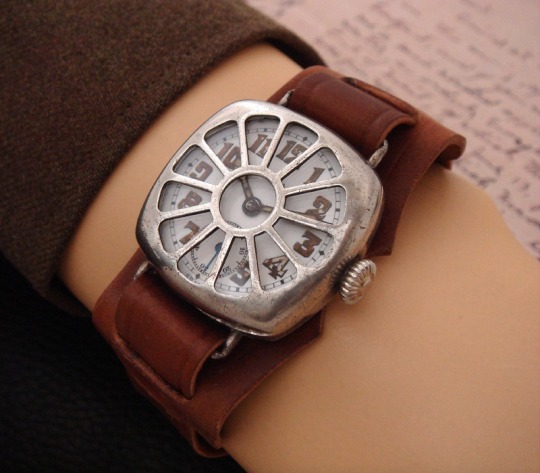
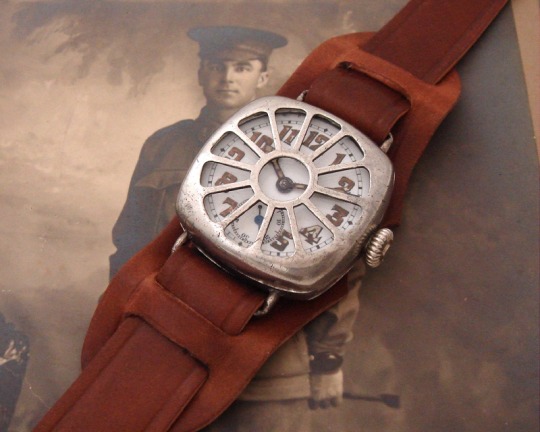
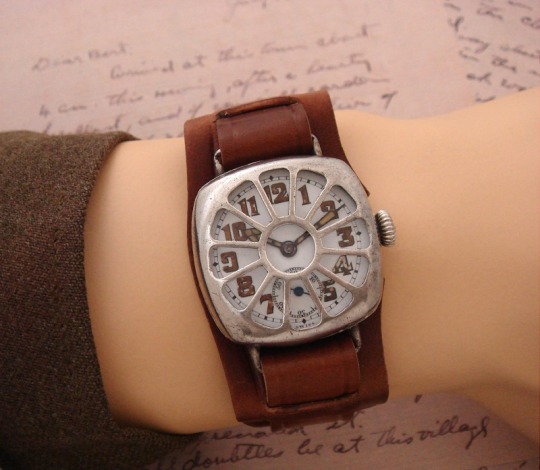
As many of you may know, Patria movements were produced by Omega and marketed under the Patria name. During World War I, Omega made a brilliant marketing decision by entering a still unproven wristlet market created by soldiers in Europe. Their Patria name became synonymous with the trench watch, and by the end the war, every man recognized the advantage of having a watch on his wrist – instantly accessible – versus a pocket watch that one would have to fumble to retrieve. The move proved to be quite profitable for Omega: today they remain one of the finest watch houses in the world.
This 33mm by 40mm lug-to-lug example in a solid silver case with integrated shrapnel guard would have been the pride of some wealthy World War I officer who could afford to purchase a fine timepiece for himself. We have taken the liberty of fitting the watch with a bespoke 2-piece caramel cordovan strap.
If you'd like to see WWI wristwatches showcased in a magnificent way, please treat yourself to the movie "1917" by Sam Mendes.
#timepiece#military watches#patria#patria watches#wwi watches#the great war#wwi timepiece#trench watch#trench watches#men's watches#men's fashion#horology#horological machines#Strickland Vintage Watches#men's wristwtaches#wristwatches#antique watches#early wristwatches#wrist art
61 notes
·
View notes
Note
As someone who does medieval reenactment in the US it was super interesting to read about how more modern reenactment across the pond works! Our group(s) tend to be much more casual and events not for the public’s viewing, and also fairly progressive relative to their area- I think the realization has come around to the older generation that they have to be actively inclusive to attract younger folks. Wishing all the best to you and other anon, I hope they can have a good time in the hobby!
If you’re interested in talking about it, could you tell us more about what it’s like to have the general public come to watch you reenact?
Oh that’s so interesting! I do forget there are events that go on not for public viewing. And I agree, I think people are realising if they want reenactments to continue, they need to be more open to the coming generations as they’ll be receiving the torch! What you say does help support one of my points too, that the further you reenact towards the 21st century, the more it strikes an emotional chord with hobbyists and spectators as both world wars are still very much in collective consciousness. People are still moved by stories and ceremonies (hell, even by seeing us in uniform!) because it’s not like this happened 800 years ago, it happened recently enough that there’s still people waiting for battlefield archaeologists to locate the remains of their grandparents from WWI. The pain and the loss are still very much alive, and for some people, especially older people, all of this felt like yesterday. It ties into the public viewings…
I’ve not done every sort of event reenactment has to offer, for me now it’s a lot of public training days with a variety of demonstrations, open period camps, and guided trench exhibitions. But having the public about makes it all the more meaningful? Living history is so important, it humanises people lumped together in textbooks. The stories that people share about the men you’re reenacting or their own parents/grandparents really are quite something. A few times we’ve done a little demonstration of wounded soldiers holding onto each other guided towards rushing nurses and crowds are absolutely captivated. A little girl once approached me and my pals to read a (surprisingly harrowing) letter she had to do for school about what it would be like to write home while in the trenches. Veterans of the regiment we do have watched us at events. Like in terms of medieval reenactment, imagine if you had children of warriors and townspeople watching you reenact members of their families that may have died horrifically barely 100 years ago, like, there’s almost a low-key emotional pressure to try to do as much justice as you can to the role over a little weekend!
I’ll have to get out to a medieval reenactment one day, haven’t been to one in a long time!
33 notes
·
View notes
Text
The Clone Wars 4.07 ‘Darkness on Umbara’ Reaction Take 2
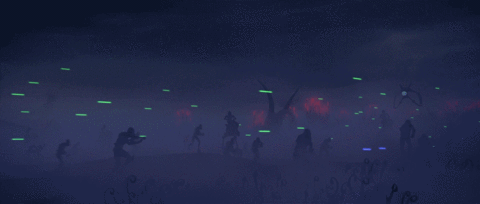
I’m doing this post and the rest of these second watch reaction posts to the Umbara arc in the more live-blogging style reaction posts I’ve done for other episodes like 1x5 ‘Rookies’, 2x10 ‘The Deserter’ and 4x5 'Mercy Mission'. So much happens in these episodes and I feel like I missed a lot of it in my first reaction posts because I was going through all the emotions.
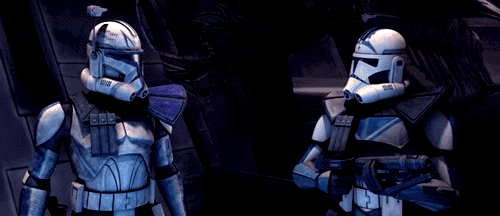
“Just like old times, Rex” WHY AM I SAD ALREADY
That is some very cool looking nose cone art on the 501st LAAT/i behind Fives. Can’t quite tell what it is but it certainly looks cool.
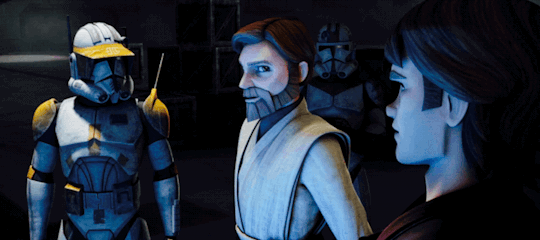
More Anakin and Obi Wan snark. Excellent. Business as usual then.
Well that’s not ominous at all

Naw, Rex checking in on Tup. I read somewhere that Tup was a shiny on Umbara but I can’t remember if this is canon or fanon.
The clone piloting the LAAT/i is named Hawk! Or at least he is according to the captions. Hey Hawk! More named clones! :D
“Time to lock and load” CACKLING
The walkers just leap backwards out the back of the low flying LAAT/i’s? How is this a good idea?
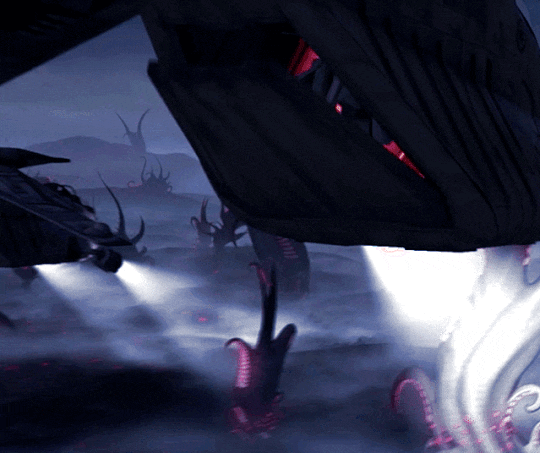
BOING. Yeet the walker.
I think this is the first time we actually hear what the clones are saying on a battlefield. Usually it’s just dialogue between the main characters but now there’s so many of them shouting and cheering and screaming and dying.
Rip the poor clone that jumped out of the LAAT/i and didn’t even make it onto the ground before being shot.
“The enemy could have the whole place rigged with traps.” Dammit Anakin you jinxed it.
“I can’t even see the enemy” Oh that’s going to come back and bite everyone in the arse really badly.
“It’s just a vine” Oh dear.

It’s the Umbaran sarlacc!
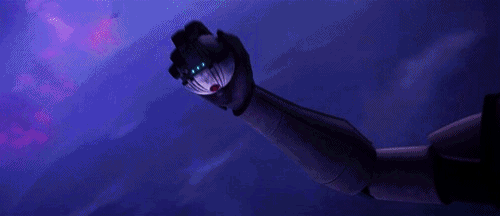
Fives being a badass and taking out the monster like it’s nothing. That was quite clever thinking in terrifying circumstances for him to keep his head and figure out he needs to get the monster to eat the explosive.
That shot of the trenches definitely reminds me of WWI and II. They’ve even got the troopers leaning against the sides with their blasters poking above the top.
“Maybe… back in the day” Dayum Rex, there a lot of feeling in that one.

Surely an ambush and skittering assassin bugs would be something that Anakin would sense in the Force?
Lmao @ Hardcase trying to take out the bug with the blaster equivalent of a rotary canon. That’s like taking a flamethrower to a spider.
Fives have you been gargling gravel or something?
Well at least Anakin got rid of the assassin bug. Again.
That shot of the bombers and Odd Ball bombing the ridge and the ensuing explosion definitely felt like a reference to the Vietnam war.
Ah great, fuck face has arrived. Fuck off Krell.
Lol the ominous music at Krell’s arrival was definitely not foreboding at aaaaaaaaall.
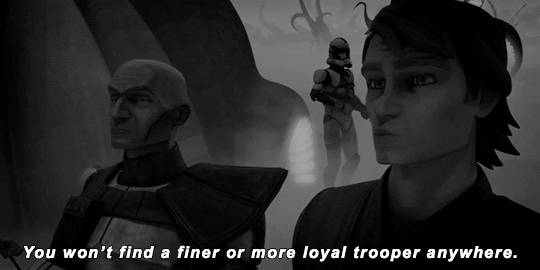
“You won’t find a finer or more loyal trooper anywhere.” DAMN STRAIGHT
How dare you impune Rex’s honour. How dare.
Cackling at Fives look at Rex immediately after Krell buggered off. He is so unimpressed.
Something about Fives’ voice is very… husky.
“The men don’t need rest” ah fuck off
Oh you did not just address Rex by his fucking number

Is this where Rex got his dramatic flair for disappearing into the fog like he did in ‘Battle Scars’ in The Bad Batch?
I just had a heartbreaking thought. Is Fives here because Echo is gone and he doesn’t have an ARC partner (and twin) anymore? So Rex is doubling as his ARC partner for now until Jesse ends up as the other ARC in Torrent and the 501st? Do ARCs have partners and come in pairs? More angst for this already angst riddled arc (in more ways than one). Yay.
Is this Phase 2 clone armour? I think it is.
Poor Rex is trying to be diplomatic and balance dealing with Krell while also showing his men that he understands their concerns as well. I do like Fives’ view on this. He’s very ‘wear your heart on your sleeve’. I also loved that little exchange, you can really tell all of their different personalities just from that conversation. Hardcase is so gung ho, bless him.
“It’s too quiet out there.” Tup you precious anxious little bean
Rip Oz and Ringo
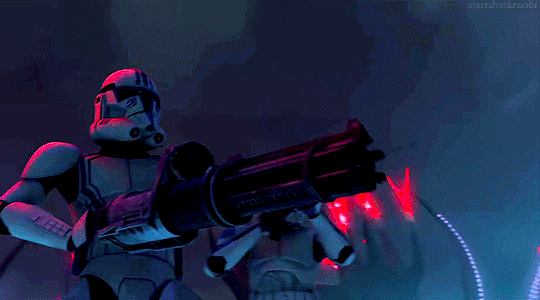
“You wanna piece of this” Hardcase living his best ‘blast everything’ life
“I think Hardcase made ‘em mad.” CACKLING
Damn, Tup just taking out that Umbaran with a flip and a point blank blaster rifle shot to the face
“Make ‘em eat heat!” Hardcase is definitely in same vein as an 80s action hero
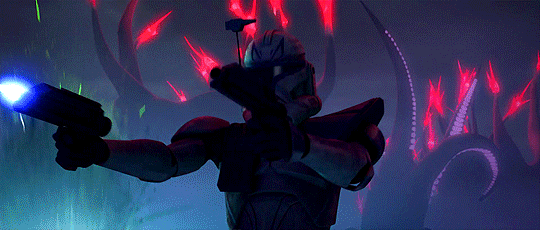
Rex just casually dual wielding with a horizontal grip like it’s nothing. Sir, you are showing off.
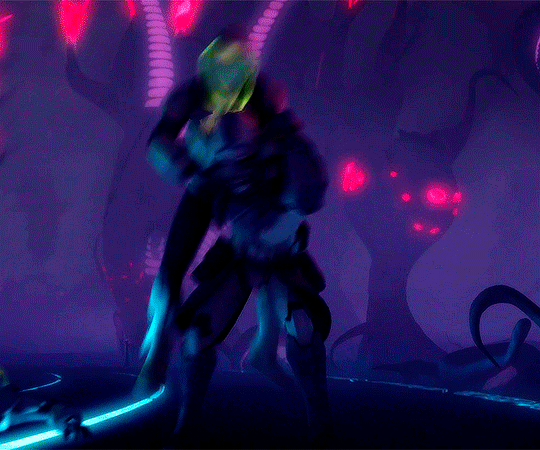
I would let Fives flip me over his shoulder and pound me into the ground. And then thank him for it. I have watched that part multiple times and it does not stop being hot. And the way he just casually stands up all cool and deadly and puts multiple blaster shots into the Umbaran. Sir, please contain your badassery. @nobie also has a fantastic gifset of this moment

Rex’s little flippy roll straight after this made me realise that he and Fives are fighting together. Oh Echo.
It’s almost jarring how noticeable it is that there isn’t a Jedi fighting alongside the clones. I couldn’t quite pick what felt off the first time until someone (Fives, I think?) mentions it later but it’s so obvious now.
“Ha, ha, ha! Where ya goin’?” Hardcase is having the time of his life atm
Did Krell just shoulder check Fives?!
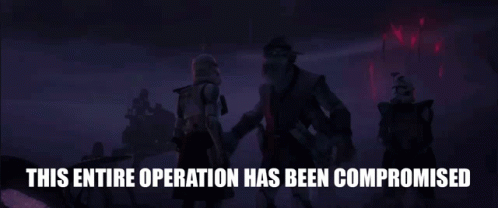
You can't jab Captain Rex in the shoulder like that!
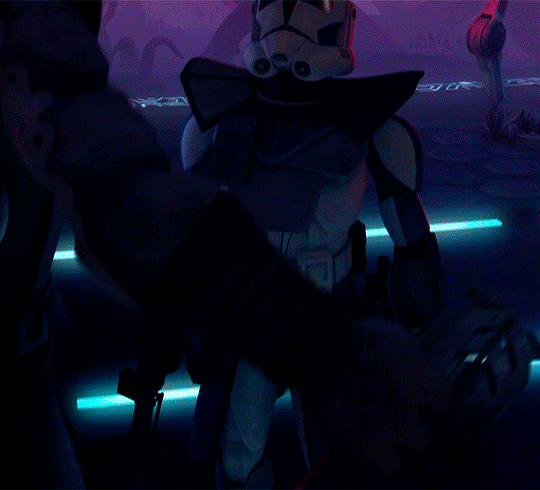
Fives saying what everyone is thinking there. Also, what kind of Jedi threatens a clone with a lightsaber? Oh that’s right, a Sith.
Rex being an absolute badass
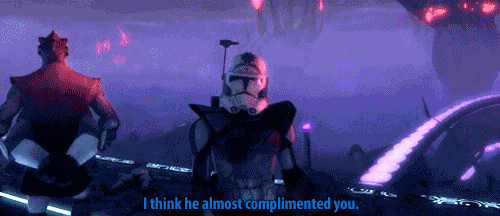
“I think he almost complimented you.” CACKLING

Fives and Rex just casually snarking while in the middle of a battlefield
#watching the clone wars for the first time#darkness on umbara#tcw 4.07#reaction#rex#captain rex#fives#arc trooper fives#hardcase#clone trooper hardcase#tup#clone trooper tup#umbara arc#pong krell#501st battalion#star wars#the clone wars#tcw#fuck pong krell#umbara
33 notes
·
View notes
Text
Questions about wizarding world building: What was the wizarding world's reactions to recent world history?
When I read Harry Potter, I feel like I'm dropped into a bubble where for the most part, recent world history doesn't exist - Or at least, no one talks about it - which is stupid! Just because this stuff is technically "muggle affairs", doesn't mean that it doesn't affect the wizarding community too!
What do I mean by this? Well, in all of the books, it's mentioned here and there that the kids are learning wizard history, but they never bring up big events like, oh, I don't know, the world wars.
Sure, the stuff that's being taught isn't that recent, but you would think that that kind of thing wouldn't be mentioned from time to time, especially since it seems that the majority of the school population are either muggle borns or half bloods.
I'm racking my brain here and the only real world events that ever get mentioned are all the witch hunts in Germany and Salem (for obvious reasons) somewhere in the books, and WWI in the second fantastic beasts movie. Even then, there's not much of a reaction to either other than "oh, what a tragedy this is! Anyway".
(spoilers for fantastic beasts two) The fantastic beasts one especially concerned me, because here you have Grindelwald showing all these wizards visions of WWII, and all the wizards in the crowd just kinda sit there in shock while they watch a nuke go off, like they can't comprehend what they're looking at. The only one who's truly terrified and devastated is Jacob, apparently the only one there who actually experienced WWI first hand when he served as a soldier in the trenches.
Like, seriously??? How do you get so detached as a society that you miss both world wars??? Or space travel! I looked it up, Harry was born in 1981, 6 years after the moon landing. He may have missed the space race but he was still alive right when space travel became relevant. He would have been 6 when the Challenger exploded, and the end of the cold war happened during his first December at Hogwarts.
The fact that no one ever brings this up astounds me. No "Happy Christmas Harry, you get a Weasley sweater, an invisibility cloak, and the safety of knowing that the world is no longer under impending doom of nuclear war"
Like seriously, do the wizards know what nukes are or what they can do? Did any of them make a mad scramble to figure out a spell to shield from nuclear fallout? Were any wizards building bomb shelters in their backyards like the muggles?
Where was Harry & his friends when the twin towers fell? Bc that was 4 years after they graduated wizard school; what were they doing at that point?
And don't even get me started on the Internet; it was invented in 1983 so Harry and Hermione would have at least known about it before they went to Hogwarts
I have so many questions
8 notes
·
View notes
Text

On one hand, the 1930 version is described as follow:
I don't watch a lot of war movies to begin with, but this one stuck out to me because the protagonist is German and the ending is tragic. The characters and setting take place in Germany and the German's side of things. Main character's name is Paul. His friends and him are naïve at the beginning of the movie and joined the war for the glory (their teacher advertised it to them) and they go. One by one they're all taken down and suffer some aspect of it. I don't remember what happens to whom, but I do remember one suffered phantom pain from a severed leg and he kept asking "Where's my leg?" or something of the like. Paul eventually goes back to his home and school and things are different. His teacher is still spewing war propaganda, so Paul warns the the current students not to join - he gets backlash. By the end he's in a battle and Paul sees a butterfly. The enemy is really aggressive but I think Paul was dissociating or something because I there were others soldiers or gunfire warning him to stay low. Paul reaches his arm out to the butterfly - that's literally all we see - and he gets shot and his arm goes still. It's tragic to me because even though the protagonist is German, he's still a soldier just like his enemies and it's the absolute fault of people of higher status that soldiers are in the position they're in. It's also one of the few movies where the protagonist dies.
On the other hand, the 2022 version is described as follow:
Based off the famous anti-war novel of the same name, it’s an absolutely brutal look at trench warfare during WWI. It deals with themes such as the futility of war, the humanity of soldiers on both sides, and how far removed the people in charge are from the realities of the battlefield. The scene that stuck with me the most was (spoilers) when the protagonist is trapped in a crater with an enemy soldier and he kills him, but breaks down as he has to stay and listen to him die and realizes that he’s just as terrified and human as him. Don’t watch it if you’re not in the mood to be absolutely gutted, but please do watch it at some point if you can handle it, because I think it’s a very important movie. It’s incredibly made, the writing, acting, cinematography, and soundtrack are all so good.
[poll runner note: also there's Daniel Brühl in it and while I try to keep a professional tone to that bracket, I'm a huge simp for him ever since I watched the Cloverfield Paradox]
40 notes
·
View notes
Note
Okay I thought of something to ramble about and it’s the utterly bizarre and confusing relationship the CW show Riverdale has to chronological time. Apologies in advance for how long this rant will be.
Disclaimer: it’s been several years since I’ve watched Riverdale, and I never actually finished the show. This is all based on my memories. Also, I’m pretty sure the seasons I never got around to get EVEN weirder with their timelines.
So, season 1 makes the setting of Riverdale anachronistic as an obviously deliberate stylistic choice. The characters all have computers and cell phones, but they’ve also got rotary landlines, and the cars all look like they’re from the 50s, and the costumes tend to be vaguely vintage-inspired. Honestly I always found this element kind of fun - it’s a unique-ish style, and it pays visual homage to the era the original comics were set. (Side ramble: season 1 is both the most normal the show ever was and also the closest it ever got to being “good” in a traditional sense. Season 1 was a reasonably competent teen drama/murder mystery with an interesting aesthetic - it wasn’t anything groundbreaking, but it wasn’t terrible. And then it almost immediately went off the rails in ways that are wildly entertaining but a lot harder to take seriously. Post-season-1 Riverdale is, imo, the peak of “makes no damn sense, compels me though” tv)
And then in season 2(?), there’s an awkward cross-promotional thing where a bunch of characters go to the movies to see the 2018 film Love, Simon, and talk about how great Love, Simon is, and shuts generally urge the viewers to please go see Love, Simon - now in theaters. And it’s like. Oh. So it is set in the modern day, then? This is just a modern day town where everyone drives cars from the 50s?
And from then on it’s kind of hard to tell if the writers are trying to set it in a nebulous anachronistic dreamscape like in season one, or if it’s concretely set in the modern day - they kind of go back and forth.
And then. There’s the time skip. I can’t remember what season it is, but eventually, the writers announce that after the characters graduate from high school, there’s going to be a seven-year time skip, and the rest of the season will pick back up with the characters as adults. This seems like an idea that will accomplish a lot: it will allow the show to stop pretending that these clearly-in-their-20s-and-30s actors are fresh out of high school, it will allow the characters to take different paths after high school and then just pick up the story when they’re all back in Riverdale, and also, it will explain away why none of these characters are wearing masks or social distancing or at all acknowledging the global pandemic that is currently happening. Win-win. Makes sense. But then.
The characters are all about to graduate, and Archie is trying to decide what he wants to do after high school - does he want to go to college, or does he want to join the army? And right before graduation, he’s in the high school, and he sees a photo of a previous graduating class of Riverdale High posing in their uniforms before they go off to fight in what is very clearly WWII. And Archie hallucinates some soldiers in WWII uniforms during graduation, and that makes him decide to join the army. So WWII happened in the past. Makes sense so far.
And then the time skip picks up with Archie getting out of the army, and in all the flashbacks, it is very clear that he just fought in WWI. There’s trenches, and WWI-style uniforms, and Archie has shell shock (which obviously can and does happen in any war, but the way it’s framed in this feels very WWI-coded. I don’t know how to explain it, but it is.) So WWI is the present now?
And Betty’s post-time skip storyline is *just* Silence of the Lambs. Like she’s training to be an FBI agent and hunting down a serial killer and there’s a lot of VERY on the nose references. So the costuming and set design of her storyline is super 1970s, but then she meets up with Archie the WWI vet?
And THEN, in Veronica’s storyline there’s a scene where she’s arguing with her dad about his sexism and she says something like, “It’s 2021, dad, women aren’t property anymore,” and it’s like. ??? You just skipped seven years into the future?? Shouldn’t it be 2028? Was the show secretly a period piece set, very specifically, seven years in the past the whole time?? If it’s 2021 why aren’t any of the characters acknowledging covid? Was Love, Simon released seven years earlier in this universe?
And then Jughead gets kidnapped by Mothman.
sometimes i will learn things about riverdale and its just. more unhinged than i ever expected
#is this how people feel about supernatural#ask#ronnie tag#this is insane ldnfkndkd#it does sound like a fun idea tho! if. there was a consistent idea behind it#like timelines converging and stuff#also as a local love simon enjoyer i do have to agree. love that book and love that movie
3 notes
·
View notes